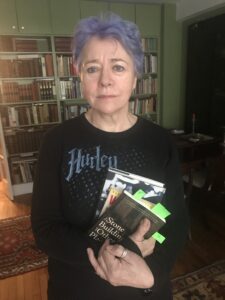HAVEL CONVERSATIONS ON ZOOM: Asli Erdogan in discussion with Elzbieta Matynia
Disturbing the Peace Award recipient, Turkish writer Asli Erdogan will talk about her position of a dissident writer, a woman prisoner of conscience, Havel’s legacy, what hope meant for him and where we should look for it. She will be in discussion with Elzbieta Matynia, Professor of Sociology and Liberal Studies at the New School in New York.
Saturday, May 8, 2 pm EST
Watch HERE

Aslı Erdoğan is the author of eight best-selling works of fiction and essays, including her best-known novel, The City in Crimson Cloak (Soft Skull Press, 2007). Her works have been translated into twenty languages including English, French, German, and published by various publishers such as Actes Sud, Penguin Random House in Germany, and City Lights among others. Erdogan was also a columnist on human rights and related topics for the newspaper Ozgur Gundem, which the Turkish government closed down in 2018 because of its pro-Kurdish position. In addition to the Disturbing the Peace Award to a Courageous Writer at Risk, presented by the Vaclav Havel Library Foundation, Aslı Erdoğan has received several prizes in literature, arts and human rights such as the Simone de Beauvoir Prize, the Karl Tucholsky Award, the Erich Maria Remarque Peace Prize, the European Cultural Foundation Award, and the Chevalier des Arts et Lettres, among others.

Elzbieta Matynia is a Professor of Sociology and Liberal Studies, and director of the Transregional Center for Democratic Studies at the New School for Social Research in New York. Her two recent books bring together theater of politics, performance art, and citizens’ agency. An Uncanny Era (Yale University Press, 2014) presents post-revolutionary conversations on precariousness of democracy between Europe’s most emblematic former dissidents: Czech playwright and president Václav Havel, and Polish political thinker Adam Michnik. Her Performative Democracy (Paradigm, 2009, Routledge 2016), explores a potential in political life that easily escapes theorists: the indigenously inspired enacting of democracy by citizens. Written by someone who experienced an emerging public sphere within pre-1989 Poland, it seeks to identify the conditions for performativity in public life.
Asli Erdogan has a beautiful, rich imagination, is endowed with immense talent and teaches us all what writerly courage is.
– Ian McEwan
The conversation will be live on ZOOM. RSVP through Eventbrite to receive a Zoom link. It will be recorded and available on YouTube.
Suggested donation $10.
RSVP HERE
The discussion is part of HAVEL CONVERSATIONS ON ZOOM.
What is the future of democracy in the post-pandemic world?
Havel Conversations on Zoom, winter – spring 2021
Today’s world, as we all know, is faced with multiple threats. From whichever angle I look at this menace, I always come to the conclusion that salvation can only come through a profound awakening of man to his own personal responsibility, which is at the same time a global responsibility.
Vaclav Havel, The Onassis Prize for Man and Mankind, Athens, 1993
International leaders, diplomats, scholars, writers, and artists in the continuing debate over the most profound issues facing the global community: freedom, human rights, the state of democracy, and global citizenship.
This event is organized by Vaclav Havel Library Foundation with support of Bohemian Benevolent and Literary Association.

